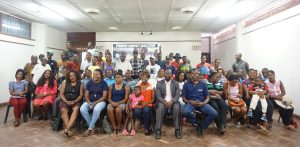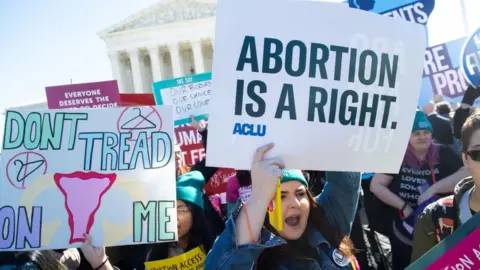
Double rugby extravaganza on at Mutare Sports Club
February 23, 2019
Government concerned about impact of climate change and mitigation
February 26, 2019Community radio station initiatives key for localised development

L-R: Kumakomo Community Radio Station (KCRS) coordinator Trevor Mtisi, Mutare Mayor Councillor Blessing Tandi and Zimunya Ward 32 councillor Herbert Gonyora during belated World Radio Day commemorations held last Saturday in Mutare.
… Media urged to be impartial and development oriented
Ngoni Dapira
THE media has been urged to be objective in its role as a watchdog of society and to also be development oriented.

KCRS stakeholders and ward representatives that attended the belated WRD commemorations in Mutare held last Saturday.
This was said last Saturday by Mutare Mayor Councillor Blessing Tandi during belated 2019 World Radio Day commemorations held in Mutare, which were organised by the Mutare based Kumakomo Community Radio Station (KCRS) initiative. World Radio Day is celebrated annually on the 13th of February and this year’s commemoration was running under the theme, “Dialogue, Tolerance and Peace.”
“Do we know what is happening everyday in Hobhouse or Dangamvura? No! That is the reason why we need community radio stations to disseminate information, whether good or bad… Radio to the people is necessary. However, the media should be impartial and put the interests of the community first. As media you should not abuse your powers as well but be apolitical, which is why community radios are important as they are not owned by government or private entities,” said Mayor Tandi.
He said radio serves as a more convenient information sharing platform citing that it was more popular and easily accessible than television because of its wide reach.
The licensing of community radio stations in Zimbabwe is provided for in the Broadcasting Services Act (BSA), under a three-tier broadcasting system comprising, public, commercial and community broadcasting. Community radio stations are however still to be licensed and legally recognised in Zimbabwe since the enactment of the BSA in 2001. Currently, the Broadcasting Authority of Zimbabwe (BAZ) has only licensed national and regional commercial and public radio stations.
Successive ministers during the Robert Mugabe era refused to entertain discussions on licensing of community radio stations and maintained a repressive approach to media freedoms, but the new despensition government has opened up to dialogue after the Minister of Information, Publicity and Broadcasting Services Senator Monica Mutsvangwa last year revealed Government’s intentions to amend the Access to Information and Protection of Privacy Act (AIPPA) and Broadcasting Services Act to accommodate the licensing of community radio stations among many other media reforms. Already early this month Cabinet repealed AIPPA in its continued efforts to align laws to the Constitution. The repeal of AIPPA will give rise to three legal instruments — the Access to Information Bill, the Zimbabwe Media Commission Bill and the Protection of Personal Information/Data Protection Bill.
Mayor Tandi said the current problems of misinformation of the public through fake news on social media can be turned around if community radio initiatives are licensed.
“Our biggest problem these days is that our people are not informed. There is a lot of diluted misinformation out there but community radio stations can serve as discursive forums which in our case can foster the brand Mutare and Manicaland that we want, promoting positive criticism especially on developmental issues,” he said.
KCRS coordinator Trevor Mtisi said since they acquired their deed of trust in 2006 they have been pushing for licensing but sadly can only operate through social media platforms, production of CDs with educative programmes and community outreach programmes.
“We have ward listening clubs with our representatives and have volunteers that we work with to gather and disseminate information. However this is not enough. Community radio stations can be a game changer that will promote an enlightened community and mainstream developmental issues… Community radio’s are apolitical and we want to strongly emphasise this,” said Mtisi.
According to the independent media advocacy watchdog, Media Institute of Southern Africa (MISA) Zimbabwe, community radio stations are a necessity and the best medium that can promote culture and ethnic languages of marginalised communities.
“National radio stations usually offer generic one-size fits all content broadcast in Zimbabwe’s major languages. Such programming is at times not relevant to specific community needs and issues. This gap can however easily be filled by community radio stations… As Zimbabwe commemorates this day (World Radio Day), MISA Zimbabwe reiterates its calls for the speedy licensing of local community radio stations. This will go a long way in giving marginalised communities their voice in national affairs that seek to promote dialogue and tolerance in Zimbabwe,” read the press statement issued by MISA Zimbabwe on the World Radio Day commemorations.
In Zimbabwe access to radio is still concentrated mostly in the urban and peri-urban communities. MISA say this means that communities in outlying, rural areas, especially those along Zimbabwe’s national borders, have to rely on radio broadcasts from Zimbabwe’s neighbouring countries.
“These marginalised communities are thus effectively excluded from participating in national conversations that take place on national publicly owned radio stations such as Radio Zimbabwe, Classic FM, Power FM, and National FM,” read the statement by MISA.
The licensing of many regional commercial radio stations in Zimbabwe such as the Zimpapers’s Group, Mutare based Diamond FM, Ya FM in Zvishavane, Nyaminyami FM in Kariba, Breeze FM in Victoria Falls and Capitalk 100.4FM in Harare, to mention a few, has in recent years grown the broadcasting sector, although according to some critics this has not translated into the much expected diversity of ownership and balanced editorial approach.
The Zimbabwe Association of Community Radio Stations (ZACRAS) is on record to argue that the radio stations licensed by BAZ in 2015 were not community but regional commercial radio stations.
Zimunya’s Ward 32 councillor Herbert Gonyora encouraged communities to support community radio initiatives citing how they helped his ward to mainstream developmental issues and constructively debate on them. He also urged government to strongly consider licensing of community radio stations.


